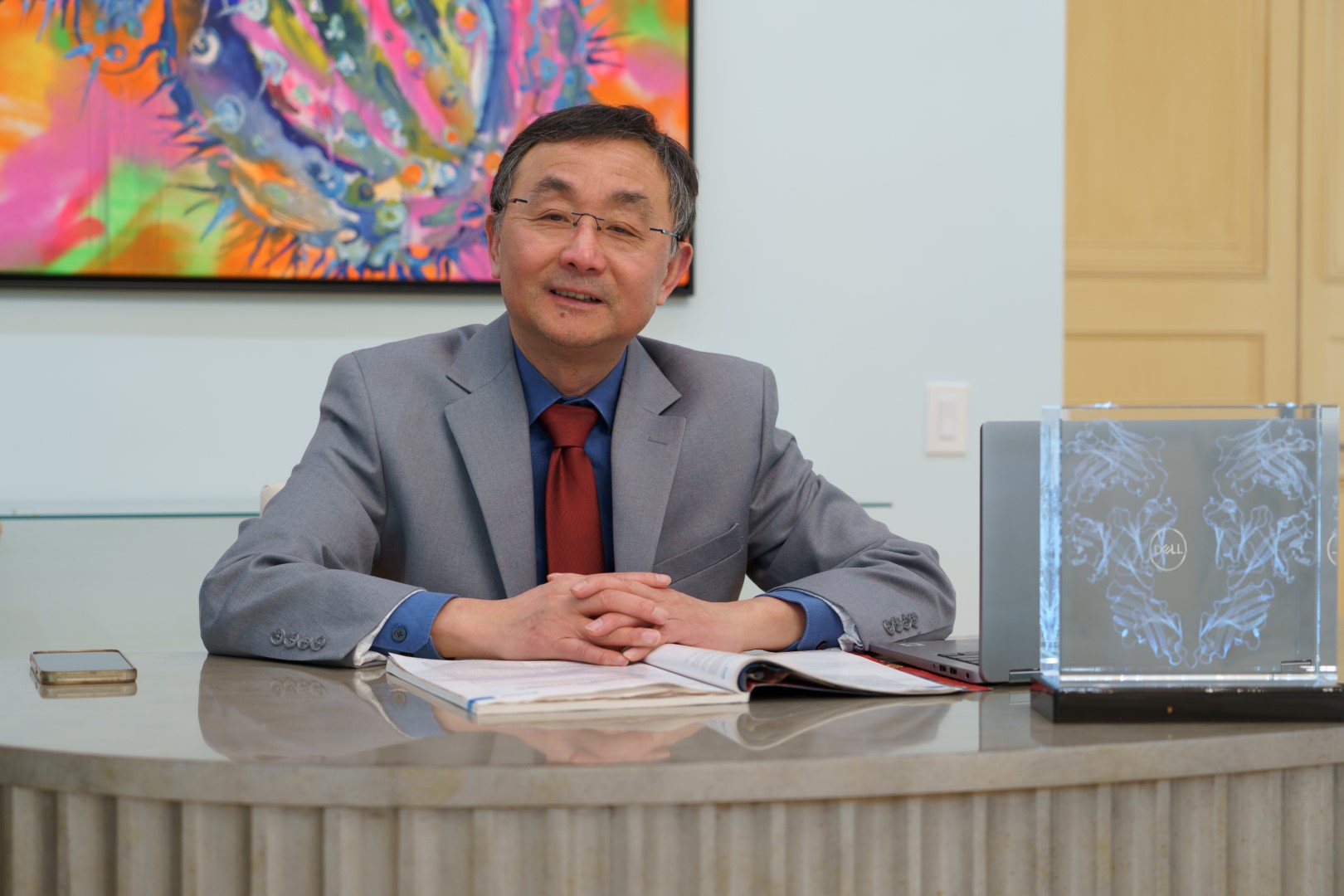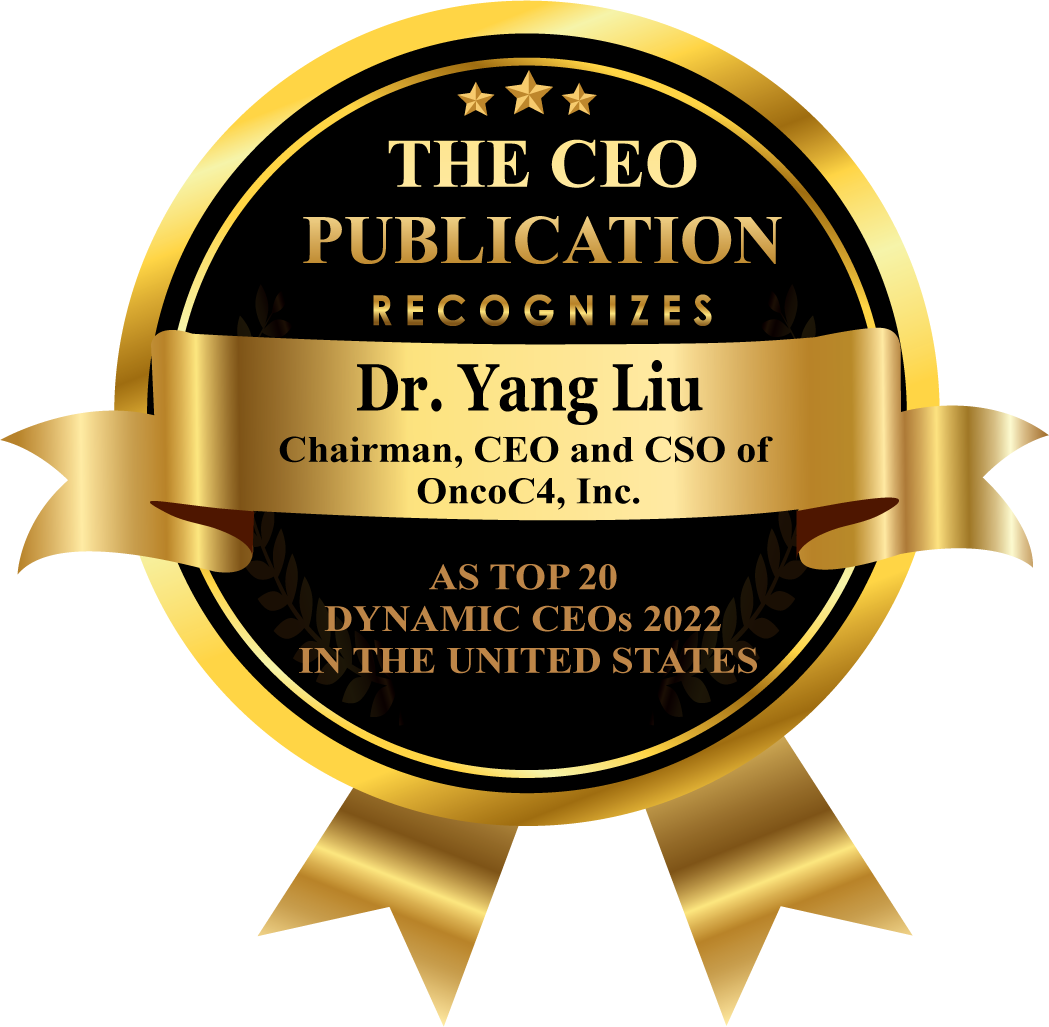On March 31, 2022, The CEO Publication, a digital platform dedicated to introducing industry experts in various specialized fields, named Dr. Liu Yang, founder and Chairman of OncoC4, Chairman and President of ONCOC4 and CSO, one of the 20 most dynamic ceos in 2022.
The following is a translation of the report.

Dr. Yang Liu, Founder and Chairman of OncoC4, Chairman, CEO and Chief Scientific Officer of OnCOC4
Dr. Yang Liu is a rare combination of an original researcher and a successful entrepreneur. As a leading cancer immunologist, Dr. Liu has worked on various independent studies at NYU Medical Center, Ohio State University, the University of Michigan, and Children's National Medical Center, where he led cancer immunotherapy programs and was awarded a title professorship before he took on the challenge of becoming a full-time CEO. Dr. Liu has published more than 200 peer-reviewed articles and filed dozens of patents, and in 2004 he was elected a Fellow of the American Association for the Advancement of Science in recognition of his pioneering contributions to innate immunity, T-cell co-stimulation, and tumor immunology.

His research career has given him focus, respect for data, appreciation for different approaches, and perseverance. With his love of science and appreciation for the talents of others, he has attracted a diverse team of successful commercial, clinical and regulatory enforcement, and biopharmaceutical researchers, and inspired the team to collectively make a revolutionary impact in immuno-oncology research to deliver safer and more effective drugs to cancer patients. He is an independent thinker who brings a different perspective to the traditional CEO role due to his years as a renowned academic researcher and has invested heavily in the company's scientific base.
Dr. Liu co-founded OncoImmune in 2000 and led the company until its acquisition by Merck in 2020. OncoImmune builds on the scientific discoveries of its founders and has taken its lead product, CD24Fc, from a basic concept to clinical trials for multiple indications.
As part of a concerted global effort to combat COVID-19, OncoImmune also completed a Phase III clinical trial, SAC-COVID, which showed that CD24Fc significantly promoted clinical recovery while reducing disease progression to death or respiratory failure in severely ill COVID-19 patients.
Following the success of the aforementioned Phase 3 trial of CD24Fc, the company was acquired by Merck for an upfront payment of $425 million, undisclosed milestones and royalties, plus a $50 million investment to enable the formation of OncoC4, a spin-off company focused on developing oncology pipeline assets.
In December 2020, with the acquisition and investment from Merck, Dr. Liu co-founded OncoC4 and serves as its Chairman, Chief Executive Officer and Chief Scientific Officer. Headquartered in Rockville, Maryland, OncoC4 is a privately held, clinical-stage biotechnology company actively engaged in the discovery and development of novel biologic medicines based on the scientific discoveries of Dr. Liu and his team for the treatment of cancer. As a spin-off from OncoImmune, OncoC4 retained its original assets except CD24Fc and injected additional capital from Merck to activate its product development pipeline focused on oncology's Best in class and First in class immunotherapies.
As a leading cancer immunologist, Dr. Liu has made pioneering contributions to the adaptive and innate immune checkpoints responsible for cancer immune escape. In terms of adaptive immunity checkpoint CTLA-4, Dr. Liu's lab was the first to identify the major ligand of CTLA-4, later known as CD86. His decades of dedicated work in ligand recognition and CTLA-4 biology has led to OncoC4's next generation anti-CTLA-4 antibody, ONC-392, which differs from other CTLA-4 antibody products by: They selectively eliminate the evading immune function of CTLA-4 by killing highly expressing CTLA-4 immunosuppressive cells (called regulatory T cells) that reside in tumors, but retain the immune tolerance function of CTLA-4 in normal tissues.
To test this concept, OncoC4 initiated the First in human study to evaluate the safety, pharmacokinetics, and efficacy of ONC-392 as a single agent in advanced solid tumors, as well as in combination with standard anti-PD (L)1 therapy in cancer patients (PRESERVE-001, Preserve-001, Preserve-001, Preserve-001, Preserve-001, Preserve-001, Preserve-001, Preserve-001, Preserve-001, Preserve-001, Preserve-001, Preserve-001, NCT04140526). Recently released data show that ONC-392 appears to have a better safety profile and higher clinical activity than other anti-CTLA-4 antibodies. In particular, promising clinical activity has been observed in lung cancer patients resistant to current immunotherapies.

Dr. Yang Liu and Pan Zheng, co-founders of OncoC4 and ONCOC4
New innate immune checkpoint
Dr. Liu's lab discovered the CD24-Siglec10 innate immune checkpoint. This pathway was initially identified as a negative regulatory pathway of inflammation induced by tissue damage, but its significance has expanded to multiple innate and adaptive immune pathways. In particular, this pathway helps cancer cells evade innate immunity in the tumor microenvironment by preventing them from being eaten by macrophages and/or killed by other innate and adaptive immune effector cells. OncoC4. Has begun IND-related studies and is expected to move its anti-SIGLEC10 antibody drug into clinical trials later this fall.
Comprehensive scientific research
In addition to his contributions to basic biology, which is being translated into clinical trials, Dr. Liu has influenced the process of linking basic and translational research to clinical development. For example, in the late 1990s, his research group was the first to use human gene knock-in mice to detect immuno-oncology drugs in an animal model. This approach has now become the industry standard for evaluating drug activity and selecting immuno-oncology drugs that target human molecules. In addition, Dr. Liu identified mouse tumor models that were most sensitive to cancer immunotherapy, which later became the model of choice for immuno-oncology drug development to study antitumor responses.
True to its roots in original research, OncoC4 is building state-of-the-art basic research facilities. This allows them to advance their scientific progress more skillfully, productively and more quickly. They also work extensively with major academic centers around the world to stay at the forefront of immunooncology research and are building a multi-center clinical trial network with leading institutes and hospitals, including key opinion leaders internationally and nationally to conduct clinical trials as clinical investigators. The unmet medical need for this segment of cancer patients who are resistant to other immunotherapy approaches on the market or who lack effective immunotherapy options has driven Dr. Liu's OncoC4 team to continue to make progress in translating their innovative immunotherapy approach into a standard of cancer care.
OncoC4's lead product, the ONC-392, is a good example of a Best in class product. The CTLA-4 targeted drug was the first immuno-oncology drug to be approved, but it has encountered significant challenges in the market because of its high toxicity, which also makes patients unable to tolerate effective doses. Their initial study found that toxicity and efficacy were due to different properties of anti-CTLA-4 drugs already on the market: toxicity was due to a reduction of CTLA-4 molecules on the surface of lymphocytes, triggering a breakdown of an important immune tolerance checkpoint; On the other hand, the anticancer activity comes from the killing of regulatory T cells in the tumor microenvironment. ONC-392 prevents the degradation of CTLA-4 by lysosomes, thereby reducing toxicity. Notably, avoiding lysosomal degradation also increased the efficacy of the antibody in tumor rejection. Based on disclosed preclinical and clinical data, lower toxicity and higher efficacy make ONC-392 the best in its class. Several competitors are all chasing the same mechanism, but not paying enough attention to the biology of their targets, which makes ONC-392 truly unique because of this unique way of acting.

Dr. Liu Yang
Into the future
The team's First in class drugs consist primarily of a large product pipeline targeting the CD24-Siglec10 innate immune checkpoint discovered by Dr. Liu's team. They have accumulated a series of unique antagonists of this pathway, targeting CD24 and Siglec10, respectively. These include anti-SIGLEC10 antibodies (ONC-841), which promote the host innate immune system to phagocytocytoses and kill tumor cells, engineered cancer-specific anti-CD24 antibodies (ONC-781), chimeric antigen receptor CAR-T (ONC-782), and T cell-involved bispecial antibodies (ONC-783). And an antibody conjugate (ONC-784).
Importantly, their product is not limited to a specific histological type of cancer, as the target is widely expressed in virtually all solid tumors (ONC-781-784), or has the potential to activate the immune system against all types of cancer.
The development of immuno-oncology drugs targeting PD(L)1 is an unprecedented breakthrough for cancer patients. However, approximately 70% of cancer patients do not benefit from PD(L) 1-targeting drugs. These cancers are known as PD(L1) resistant/refractory cancers, and treatment options are very limited. Preliminary data show that ONC-392 induces complete or partial rejection of PD(L1) resistant/refractory tumors in lung cancer patients and triple-negative breast cancer patients, and can be extended to other cancer types resistant to immuno-oncology drugs, such as ovarian cancer.
OncoC4's greatest achievement to date has been the success of its First study in human beings. The company announced very promising results for ONC-392 in 10 patients treated with the drug on November 9, 2021. The data showed that 6 out of 10 patients showed beneficial clinical activity.
Most notably, in a cohort of six patients at the 10mg/kg dose, one patient with non-small cell lung cancer (NSCLC) and one patient with ovarian cancer had a complete response (CR). Of the four patients in the 3mg/kg dose cohort, two patients, including one with NSCLC and another with ovarian cancer, had stable disease (SD) for more than seven months in this report.
In addition, of the 10 participants, three patients with stage IV non-small cell lung cancer had previously developed acquired resistance to PD(L)1 therapy (acquired resistance is defined as disease progression six months after receiving PD(L) 1-targeted therapy). All of these patients showed evidence of clinical benefit for ONC-392: one patient had CR, one patient had SD, showed a significant reduction in tumor load, and the third patient had the opportunity for surgery due to the disappearance of multiple cancer metastases. These data suggest that ONC-392 monotherapy has good antitumor activity in patients with stage IV cancer who have failed previous multiline therapy and have acquired resistance to previous PD(L)1 therapy.
The company is currently preparing to initiate Phase 2 clinical studies aimed at addressing the unmet medical needs of the majority of cancer patients who have developed resistance to currently approved immunotherapies. With the imminent launch of Phase 2 clinical studies, OncoC4 is one step closer to realizing the significant clinical impact this drug could have on cancer immunotherapy for healthcare facilities and patients. Their success will also reignite interest in CTLA-4 as a target and new approaches to CTLA-4 targeted therapy, while potentially providing treatment options for more patient populations that currently have no effective measures.
